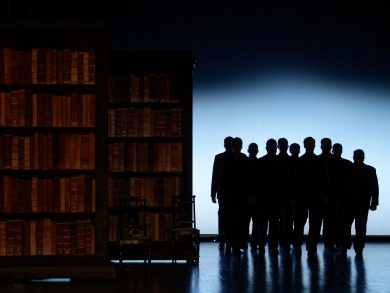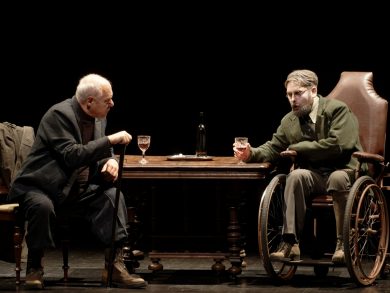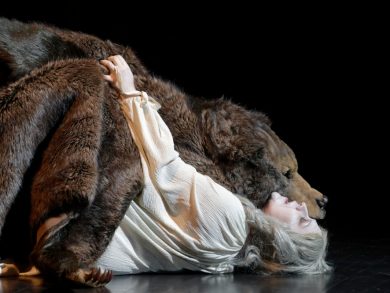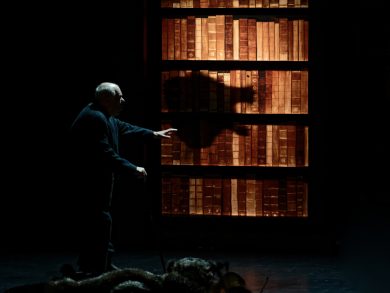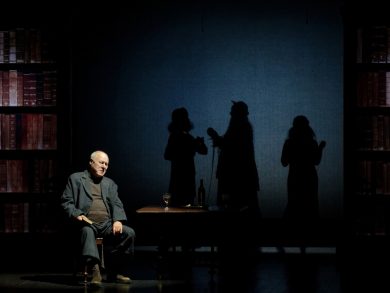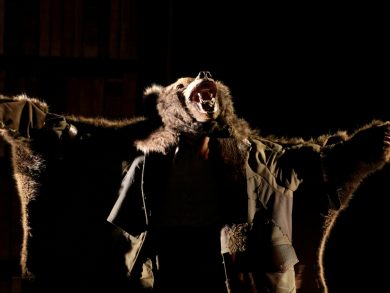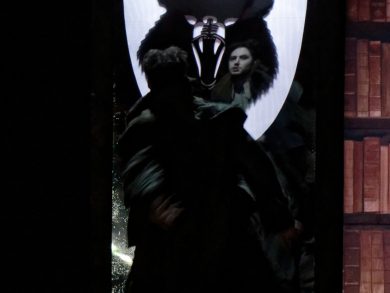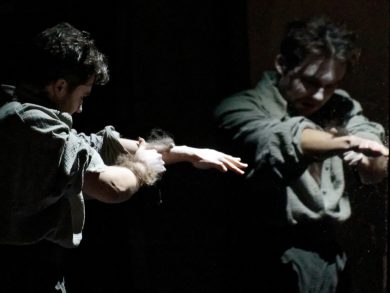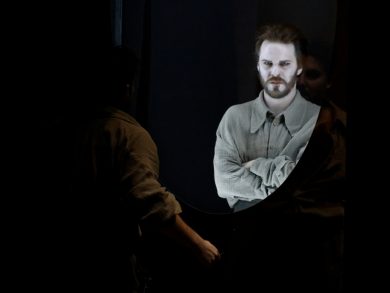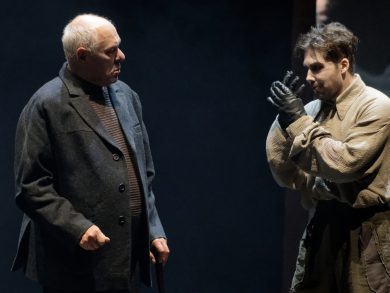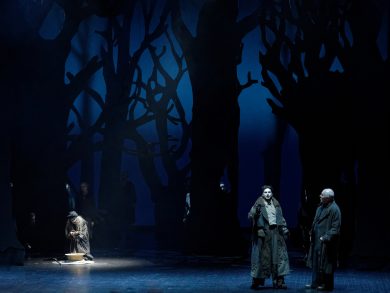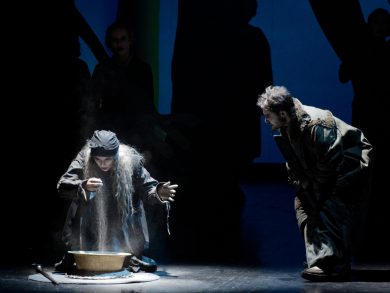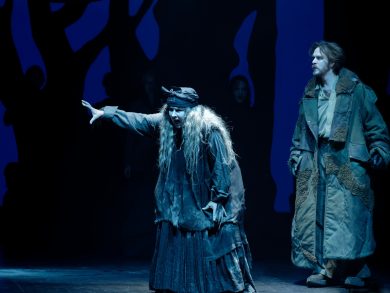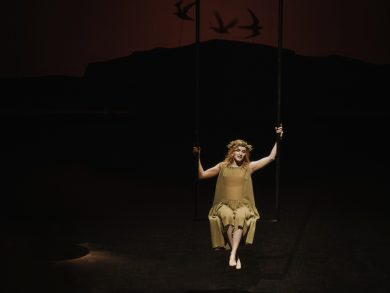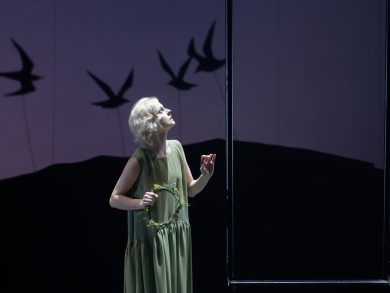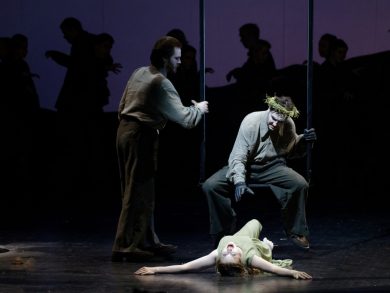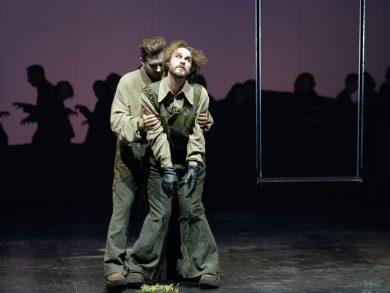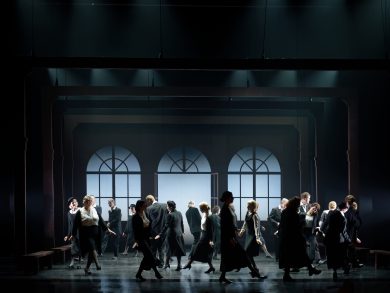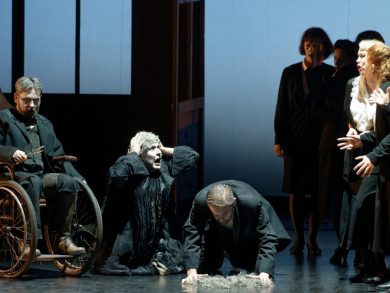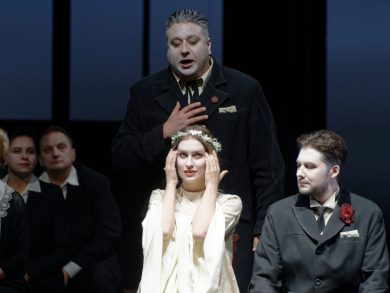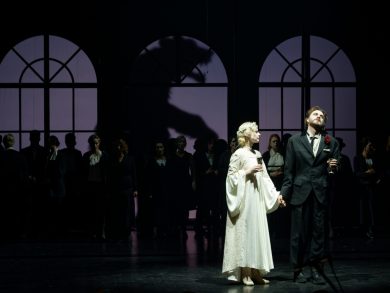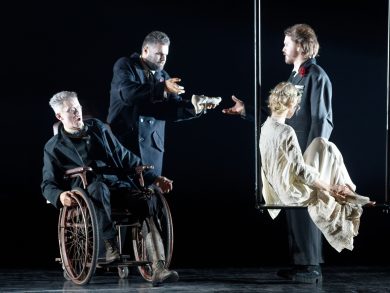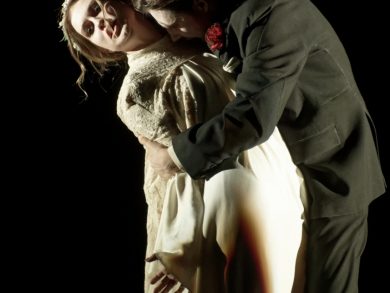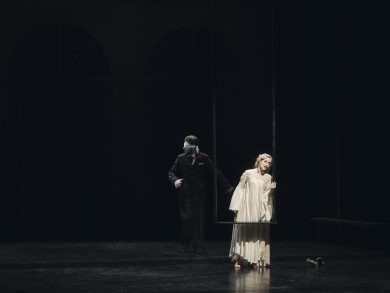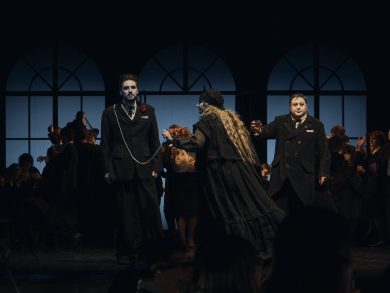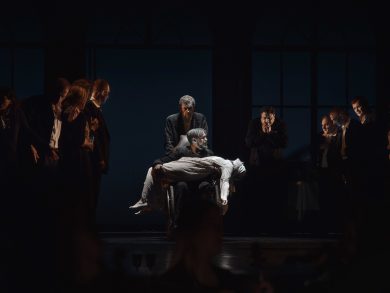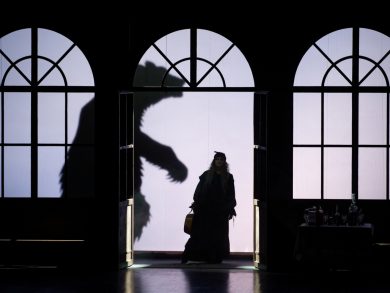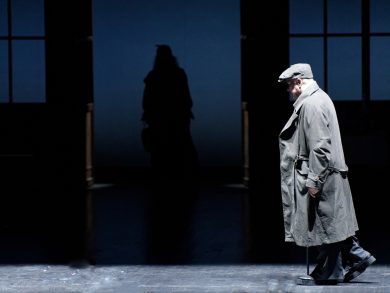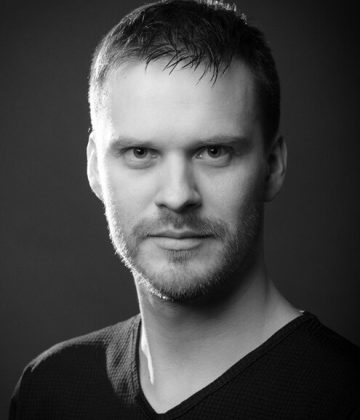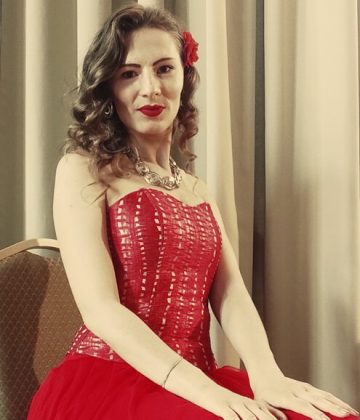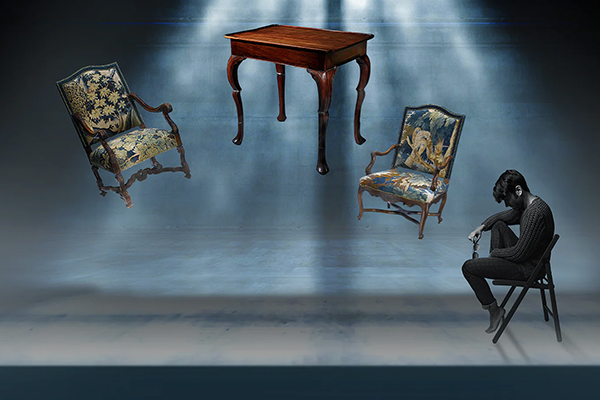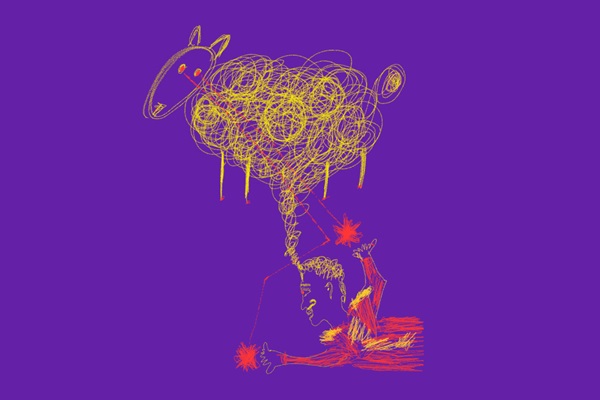THE BEAR
An opera in 2 acts, sung in Lithuanian
Libretto by Aušra Marija Sluckaitė-Jurašienė after Prosper Mérimée’s novella Lokis. A Manuscript of Professor Wittembach
The Bear (2000) is the third opera by Lithuanian composer Bronius Kutavičius (1932–2021) and his first contribution to the genre of grand opera – if not in terms of duration, then in terms of large-scale cast including many soloists, full orchestra, mixed choir, and even ballet scenes. It is often described as a ‘mystic thriller’ based on a libretto by Lithuanian writer Aušra Marija Sluckaitė-Jurašienė, in which she retold the story of a bloody wedding taken from the gothic fantasy novella Lokis (1869) by Prosper Mérimée. The story is set in the ‘savage land’ – a remote corner in 19th-century Samogitia – where folk customs and pagan beliefs still have a hold on population. A pastor coming from Königsberg to visit his old friend, Count Szémioth, finds himself the guest of a strange family consisting of the young count, Michel, who exhibits animalistic behaviours, and his mad mother who, as legend has it, was raped by a bear at her own wedding. Reputed to be the product of this bestial assault, the half-human half-bear falls in love with the beautiful girl from the next manor, Miss Julia, and asks for her hand in marriage in hopes of taming his dual nature. But the beast takes over his personality until he finally kills his bride by a bite to her throat on their wedding night …
The opera was commissioned by the 2000 Vilnius Festival and premiered that same year at the Lithuanian National Opera Theatre where it ran until 2007. In the fall of 2022, the 90th anniversary of the composer’s birth was marked with the second production of The Bear at the Klaipėda State Music Theatre where it was staged by renowned Lithuanian theatre director Gintaras Varnas. When describing in what respects his staging was different from the previous production by Jonas Jurašas, he told that he was “not so much concerned with the ethnographic details of the novella or the image of Lithuania as a backward, barbaric ‘country of murderers,’ which was quite widespread in Western European literature at the turn of the 19th and 20th centuries. Today it seems so much more exciting to treat this opera as gothic fiction. The plot itself can be easily classified into a vampire theme characteristic of horror movies of the silent era. The plot centres on the dark side of human nature, the duality of human-beast, and on the issue of how much bestiality there is in the human soul, to what extent one can defy bestiality and retain humanity.”
Collision between human bestiality / feral nature (symbolized by a bear in the opera’s title and epigraph Meška su lokiu abu labu tokiu – “Grizzly and bear make quite a pair”) and human society / civilization is the key theme in this opera, which underpins both conceptual and visual design of this production. It is manifested through the conflict between the manor house and murky woods, civilized world and primordial chaos, culture and nature, light and darkness. These dichotomies were embodied on stage by a team of acclaimed Lithuanian artists and conductor Martynas Staškus as its Music Director, who had previously collaborated with Kutavičius during the first production of this opera at the LNOBT and the recording sessions for the Finnish label Ondine (2002).
Watch the recording of this performance >>
AWARDS
Mask of Gratitude (25/03/2023, Klaipėda) to Gintaras Varnas for the staging of Bronius Kutavičius opera Lokys (The Bear) in the category Best Director of the Year
Golden Stage Cross (26/03/2023, Vilnius) to Gunta Gelgotė for the role of Julia in Bronius Kutavičius opera Lokys (The Bear) in the category Best Soloist of the Year




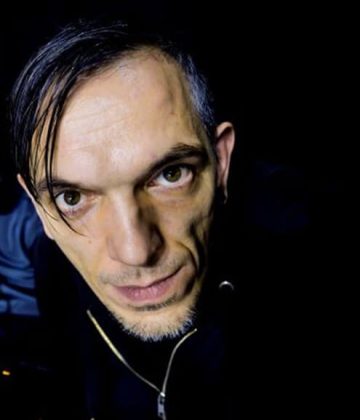


PROLOGUE
The action takes place at Count Šemeta’s estate in Medintiltis and its surroundings, in Samogitia, Lithuania, in the 19th century. The men’s chorus sings a pagan incantation: “I’m going to expel that evil spirit. Get thee out, evil spirit, through the bones, through the brain, through all the veins from that man, Count Šemeta…” A carriage is heard approaching. Horses neighing.
ACT I
Count Šemeta’s estate. Library room. Professor Wittembach, an accomplished linguist and a Protestant minister, a friend of the old count, arrives from Königsberg to the manor of Medintiltis in Samogitia, in rural Lithuania. Pranciškus, a mute butler, is waiting for him in the manor library. The Professor asks when he will be able to see the young master of the manor and is surprised that the servant bows and leaves instead of answering. On the library shelf, the Professor sees a book he has been looking for a long time: the Catechismus Samogiticus.
The Doctor, a former military surgeon and veteran, arrives at the library in a wheelchair to greet the guest. He invites the Professor to join him for dinner, as the Count has a migraine. The Doctor tells him about the Count’s strange habits, his passion for hunting at night. He also warns that the Count’s mother, the old Countess he is treating, has been suffering from a mysterious illness for many years: she was taken and mauled by a bear during a hunting trip shortly after her wedding, and has been suffering from a clouded mind since then. The Countess was rescued by her servant Francis, who was then scared out of his wits and lost his speech.
Before the Doctor can finish his story, the old Countess with the long grey hair and the knife in her hand bursts into the room. The servant Pranciškus follows her in and tries to stop her. Tormented by her past experiences, the Countess uses the knife to stab the bear skin and curses what she imagines to be her unborn child. The Doctor takes out a pair of large scissors and threatens to cut off the Countess’s hair. He thinks this is the only way to appease her. The Doctor and Pranciškus take the Countess away. The Professor wonders what is happening at his dead friend’s estate: is it a dreadful dream or an even more gruesome reality?
Night. A one-eyed Old Woman is seen in the back of the stage. She is singing a folk song. To calm down, the Professor opens the Catechismus Samogiticus, but falls asleep, lulled by the Old Woman’s song.
The hoofbeats and the neighing of a horse is heard. The professor stirs from his sleep, looking around. Outside the window he sees a man dressed in black and wearing black gloves. The black night visitor laughs and disappears. The Professor, frightened, calls Pranciškus for help.
The Count’s room the next morning. With his shirt unbuttoned, the Count shaves his chest hair. He is talking to his Doppelganger – his reflection in the mirror – about the duality of nature, the attraction of the forest, the lust for blood and the longing for love.
The Professor enters. The Count hastily buttons his shirt, greets the distinguished guest, a friend of his father’s, and reminds him that his wedding to the noblewoman Julia is in three days. The Count extends his gloved hand to the Professor. The Professor looks at the black glove, at the Count’s eyes, as if remembering something, and shakes his hand in confusion. After excusing himself by saying that he is wearing gloves because of his allergy to dogs and horses, the Count asks how the Professor rested last night. When he hears that he has been haunted, he laughs with the laughter of a night guest… The Count diverts the conversation by jokingly saying that the Professor has apparently been haunted by the pagan gods lurking in the woods, and suggests that they go for a walk in the woods together and visit Miss Julia.
The Count and the Professor are walking in the forest. The Professor asks about Julia, says he has heard much about her beauty. The Count says that he is particularly fascinated by her white, transparent skin: when she drinks wine, you can see the blood pulsing in her veins, warm and sweet…
In the depths of the forest, the one-eyed Old Woman sits by a smouldering fire, singing the same song that the Professor has heard in his vision. When the Count and the Professor approach the Old Woman, she asks them to put a small coin into her lap. The choir again sings a pagan incantation against the evil spirit. The Old Woman asks for a second piece of silver, in return for which she promises to tell the Count’s future from the ashes. She says that the Count is at the crossroads: if he turns to the right, where Julia lives, he will be in trouble. He must go to the left, to the beasts, and become their king. The Count is annoyed by the Old Woman’s prophecies. He quickly leads the Professor through the forest and turns right.
A lake at the edge of a forest. Miss Julia’s abode. Julia swings in a swing and sings about a mermaid, who is accompanied by nothing but mute pain in the human world, about the longing for love and fear (aria “My cold sister mermaid, it hurts you when you walk over the pebbles of the shore”).
The Count, his Doppelganger and the Professor approach Julia. She hands them glasses of red wine and dances barefoot for them. Suddenly a seagull screams, the glass falls from her hands and breaks into small pieces. Julia steps on the shards of glass and pierces her foot. Seeing the blood, the Count greedily sucks his lips into the wound. Horrified, Julia pushes the Count away from her (“What are you doing, Count?! My blood… It’s as cold as the mermaid’s from the lake…”).
The awkward scene is interrupted by Pranciškus running in. He signals the Count to hurry home – the Countess is having a fit. The Count bids farewell to his fiancée until the wedding on Sunday and leaves. Julia has a bad premonition (“I’m scared… The Count’s eyes were burning with a yellow flame…”).
ACT II
Wedding day. Ballroom. Guests await the arrival of the bride and groom – Count Šemeta and his fiancée Julia – and chat about the unexpected wedding. Guests dance a polonaise. The Doctor treats the guests to drinks. The Professor is worried that the bride and groom are not returning for a long time.
The rumble of an approaching carriage is heard. The guests greet the newlyweds. The old Countess, who had been sitting quietly in the hall, sees that the Count is holding Julia in his arms and starts screaming “It’s a bear!”. She tries to shoot him. Pranciškus runs in. The guests are in a state of confusion. The Doctor grabs the Countess and cuts her grey hair. The guests whisper about the signs of ill fate, the lunar eclipse at midnight on the full moon.
The Count apologises to the guests for the embarrassing incident and invites the wedding marshal to begin the oration. The Professor joins the hands of the bride and groom and says the oath, which is repeated by the Count and Julia. The Professor blesses the newlyweds. The ceremony is concluded by the guests singing a hymn from an old hymnal published in Königsberg.
The Count toasts to the happiness of both. Julia reciprocates and hopes that a special destiny awaits them. The Doctor intervenes in the duet by offering to drink from the young lady’s shoe, as is the custom of the cadets. The Count removes Julia’s shoe and stares at the bloodstain left by her pierced foot. The Count is caught up in the heat of the moment, the blood lust that is hard to suppress (“O Julia, my mermaid! It is not true that your blood is cold. I feel it is warm, thick and strong, like precious wines…”). Julia is increasingly overwhelmed by anxiety, which she tries to suppress and rely on the healing power of love (aria “Calm down, my heart! And don’t shiver, as if in a dense forest…”).
The wedding revelry is becoming rampant. Three wind bands play light party music over each other, accompanying a whirlwind of people dancing. At the height of the frenzy, a one-eyed Old Woman appears in the hall. She offers to be a matchmaker. The guests wonder who she is – a beggar, a homeless woman, a witch? The Old Woman says she has come uninvited to wish the newlyweds not to be separated, not only in this world, but also in the other world. She tells the Count that the spell has been cast: the Count himself has chosen to go straight to the Lord of the Underworld and she will accompany him there herself. There is the sound of a clay pot breaking. She disappears.
When the Old Woman leaves, the guests continue dancing, singing and raging as if nothing had happened. Suddenly, a shot rings out. The Doctor rushes out in his wheelchair to the garden to see what has happened and returns holding Julia’s dead body with a bloody neck in his arms. The guests whisper, overwhelmed by the disaster. The old Countess appears in her wedding dress, holding a pistol. She looks around, searching for something. The Count, in a single shirt, enters, limping with a shot leg. The Countess, shouting “A bear!” again, raises her pistol and fires. The Count falls dead. Everyone stands as if petrified.
EPILOGUE
The Professor leaves the manor of Medintiltis. Behind the stage, there is a chorus begging for forgiveness and a voice singing a farewell: “I’m leaving and take nothing along, but the heart takes it all on the road.” At the same time, the last sentences from Prosper Mérimée’s novella Lokis sound as if they were echoing in the Professor’s mind.

